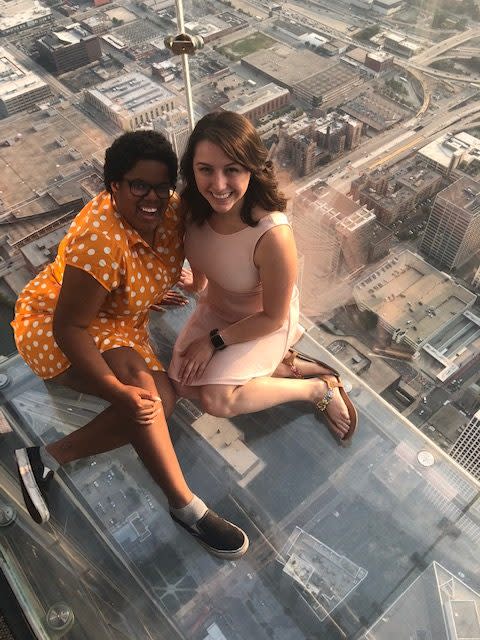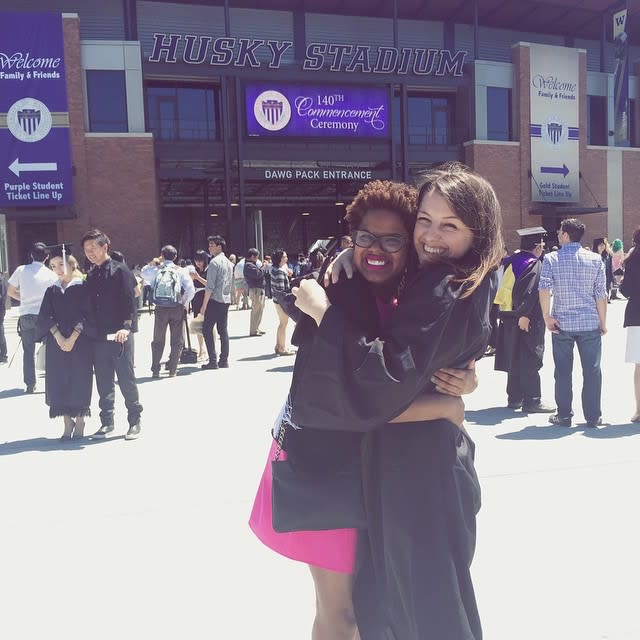How I learned to stop competing with my best friend by finding strength in our differences
One night, while I was scrolling through my Facebook feed, I came across an article. It claimed if you were friends with someone for more than seven years, the friendship would last you a lifetime. I promptly checked my calendar, texted my best friend, Annabel, and told her that we had beaten the odds. We had been best friends for close to a decade. And even though a whole decade of friendship had come and gone, I like to think that we were all the better for it. At the very least, I was better for it.
When I tell people the story of how Annabel and I met and became the dynamic duo that we continue to be today, I preface it by saying, “This is going to sound like the beginning of a love story, and I guess, that in some way, it is.” We met our freshman year in high school. She was a popular cheerleader, and I was a member of the marching band’s color guard. I’ll admit I didn’t like her right off the bat. I was incredibly insecure, and she represented all the things I didn’t believe I was capable of being. She was smart, funny, beautiful, and nice to everyone, including me. So, naturally, I spent that year trying to avoid contact with her at all cost.
Eventually, the school year was over, and summer began. I was lucky enough to secure a spot volunteering at the local library to help teens sign up for our summer reading program. At the time, I believed libraries were a safe space, and I often took refuge in them during some of the harshest years of my youth. So when I walked into the library and spotted Annabel on my first day, I groaned. Could she even read?! Why was she even here?! Next thing you know it, we made eye contact, I instantly cringed, and made sure I sat as far away from her as humanly possible. I wanted nothing to do with her, but, of course, that didn’t last for long.

Fast forward a month: I found myself spending days, even weeks, at Annabel’s house, where I became a member of her family. I would spend hours killing Nazi zombies with her younger brother, Tony, while we played the Resident Evil video game and ate boxes of Kraft Mac & Cheese. And she and I would play Just Dance like our lives were going out of style. We laughed, we gossiped, and we rode around in the backseat of her mom’s minivan, singing along to our favorite tunes on the radio. I remember the hijinks we managed to get it into, like the time we took her grandfather’s truck around the block, laughing and screaming as we drove down the street. It almost felt like we had been best friends for years, even though we had only been together for a few weeks. But that’s the magic of a good friendship: It wasn’t hard to be around each other; in fact, it sometimes felt like the easiest thing in the world.
That’s not to say that our friendship is perfect, because it isn’t—it’s far from it.
Within the first few years, I moved in with her family because my mother and I became homeless. I was lucky that Annabel’s family had room for me, even though her brother had to sleep on the couch so I could have a bedroom to sleep in. Of course, neither of our home lives were perfect, but we made do with what we had—including each other.
Unfortunately, my insecurities often got in the way of me being a good friend. They would prompt me to start arguments and call timeouts to give each of us space. My self-esteem was at rock bottom, and I often took it out on her. Because I didn’t think I was pretty enough or good enough to be her friend, I would pick fights, hoping that she would come to her senses and realize I wasn’t cool enough to be her friend. Meanwhile, on the other hand, I hoped she would continue to hang out with me because she believed I was funny and sometimes, you just need someone to see the good qualities you miss. However, our friendship came to a halt.
One day, I was complaining about not having a date to the prom and she claimed I was being a negative person—which, in fairness, I was. We argued for hours, furiously calling each other out for our bad habits. Then, there was silence. I deleted her number from my phone, and we ended up not talking for months, even after when my family moved into our new place. Honestly, I missed her terribly, but I didn’t want to apologize first. I knew that I was in the wrong, so I was the one who swallowed my pride.
One day, when her mother came over to my new home with bags of groceries, I sheepishly told her to tell her daughter I said, “hello.” While I didn’t expect anything to come out of it, my phone lit up with a text from a familiar number. “Hi,” she wrote, and I smiled. It was a new day. Our friendship had shifted. We both had grown up.
The truth is, growing up was hard, especially when I continued to feel like I was falling behind. Even though Annabel and I went off to college in the same city, we rarely saw each other for the first few months. After attending a semester at my private university, I was told that I should seek an education elsewhere due to financial hardship. Once again, I found myself sleeping on Annabel’s and her boyfriend at the time’s couch. This is where I felt like the competition really set in.

I’ve always felt like Annabel and I were polar opposites. I eventually enrolled in community college, and Annabel studied abroad. She graduated with her Bachelor’s, and I earned my AA a year afterwards. She got engaged; I remained hopelessly single. When I voiced my insecurities, I didn’t feel like she always heard me. Because of this, I would often lash out and yell at her. This was the only way I knew how to communicate, as this was how I grew up. But this toxic form of communication ultimately caused a shift in our friendship.
It took some time, but I had to learn that my best friend is a different person than I am. When she hears a non-personal problem, she immediately wants to solve it. And when I think of a solution, I don’t have the urge to deal with it right away. I eventually learned that that’s okay—actually, it’s better than okay, because we use each other as a sounding board and respect each other’s opinion, even if it’s not the opinion that we want to hear.
After I graduated with my AA degree, Annabel decided to go into the Army. Suddenly, I went from seeing her every day to communicating with her over email. It didn’t matter because she was following her path, and I was discovering my own. But when she announced that she was moving across the country to Texas, it was the first time in almost seven years that we were going to become long-distance friends.
With a decade under our belts and countless blurry photos to fill our camera reels, I often sit back and reflect on who we’ve become.
At the end of the day, we’re no longer teenagers. Our knees hurt; we can’t pop, lock, and drop it; and pizza gives us heartburn. But we communicate better, forgive quicker, and laugh harder. That’s how growing up works. And while we may not always get along (because who does?), our timeout periods now only last a few hours versus a few months.
Our relationship is completely different now. She supports me by driving down to watch me celebrate my first book. She loves me for who I am, and who I continue to become. And now that she lives in Missouri to become a physician assistant, I would do the same for her. We text every other day and try to make time to see each other’s faces at least every two weeks. And we’re even attempting to take a trip together every year. For us, it’s not always about the big things. While we’ll randomly send each other cards or little trinkets in the mail, sometimes you see something and must let your best friend know that you’re thinking about her.
I won’t lie: I still get jealous of Annabel. There are times where I feel like no matter what I do, I can’t compete with her. We look nothing alike. I can’t fit into any of her clothes. And we have completely different personalities. But every time I tell myself that I’ll never measure up to her, I have to remind myself that in the end, that’s okay. We are different people and it doesn’t mean that I’m any less than she is. If anything, it makes us equals in our own right. Yes, I’m still working on my self-esteem, and yes, I still have doubts. But I can’t place my feelings on someone instead of doing the work myself. That isn’t fair to them or myself. And, frankly, that’s not the reason why our friendship works in the first place.
I honestly don’t think I would be this version of myself without Annabel. I don’t even know if I would have survived without her. Maybe God brought her into my life because He could sense that I would need a true friend to get through this life. I’m not really sure. But what I am sure of is that volunteering to work in that library changed my life—and I wouldn’t have it any other way.

